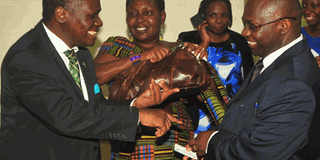EU backs Opposition on 2016 electoral reforms

DP president Norbert Mao (L), Masindi Woman MP Jalia Bintu (C) and Foundation for Human Rights Initiative executive director Livingstone Sewanyana (R) at the electoral reforms meeting in Kampala on Thursday. PHOTO BY STEPHEN WANDERA
What you need to know:
Way forward. The EU head of governance says they are in talks with the government on the best way to support electoral reforms.
Kampala.
The European Union (EU) has backed the Opposition’s proposed electoral reforms saying they will deepen democracy in Uganda and pave way for free and fair elections in 2016.
Speaking at a meeting with MPs and the civil society on electoral reforms at Imperial Royale Hotel on Thursday, Mr Jean Louis Ville, the EU head of governance, democracy, gender and human rights in Brussels, said the government and EU are in advanced talks to identify areas of cooperation.
“I am not here to tell you what to do but the electoral reforms are good for democracy. We (EU) are discussing with the government on how to support this process,” he said.
Mr Ville said EU is interested in seeing democracy and better governance in Uganda. The meeting convened by Citizens’ Coalition for Electoral Democracy in Uganda (CCEDU), attracted more than 50 MPs.
A proposal to restructure the electoral process was adopted from ideas mooted by CCEDU, a broad coalition of more than 600 civil society organisations.
CCEDU proposed that Article 60 (1) of the Constitution be amended to rename and reconstitute the EC as the “Independent Electoral Commission”. They also proposed that Article 60 (2) be revised to provide for an independent EC with professional commissioners and technical staff who can manage electoral affairs more efficiently and impartially.
EC to reflect diversity
In justifying the need to review the EC composition, Foundation for Human Rights Initiative executive director Livingstone Sewanyana said: “The composition of the EC must reflect a diversity of skills and social demographics, necessary to ensure an Electoral Commission functions efficiently and appropriately in managing electoral processes.”
On the proposal to change the EC name, the document states: “The current name does not convey the body (EC) as an independent, impartial and fair reference that can preside over elections and referenda”.
Reacting after the proposals were presented, Butambala County MP Muwanga Kivumbi warned that mere change of name will not yield the desired results.
“President Museveni has been in power now close to 30 years and has infiltrated all government institutions. What we need is a national consultative dialogue to forge a way forward,” Mr Muwanga said.
The draft proposes amendment of Article 60 (3) to provide only one term for the EC commissioners. The current law provides that the appointment of the commissioners may be renewed by the President for one more term only. Most of the MPs endorsed the proposed electoral reforms saying the changes would rebuild public confidence in elections.
“These changes are overdue and necessary to build confidence in our voters,” Samia Bugwe South MP Julius Maganda told Saturday Monitor later.
DP president Nobert Mao was wary that President Museveni will not assent to the electoral reforms.
“We all saw when the Judicial Service Commission recommended Justice Bart Katureebe to be Chief Justice but Museveni refused. Mr Museveni is the leading NRM ‘lion’. If all animals passed a resolution that they should be vegetarian, the lion can decide not to abide by the resolution. So those who know the lion ensure that when time comes it should abide by the resolution,” Mr Mao said.
Cabinet calls for amendments
Cabinet is considering amending the 1995 Constitution to provide for an independent Electoral Commission, stipulate grounds for recalling MPs, establish a salaries commission and give more statutory powers to the President.
During the State-of-Nation address about a fortnight ago, President Museveni told Parliament the government would table proposals for amendment of some sections of the Constitution.




